Let’s talk about David Swensen, the mastermind who transformed a cool billion into a whopping $34 billion for the Yale Endowment Fund. But did he use witchcraft to achieve this brilliant feat? Absolutely not! He went against the grain, using a maverick investing approach that combined razor-sharp analysis with strategic asset allocation.
So if you’re itching to unlock the vault of his success and potentially earn billions yourself, buckle up. In this piece, we’re going to explore the top 15 nuggets of wisdom from Swensen that encapsulate his investment insights. Keep reading to discover the secrets behind early retirement!
1. “Active management strategies demand uninstitutional behavior from institutions, creating a paradox that few can unravel.”
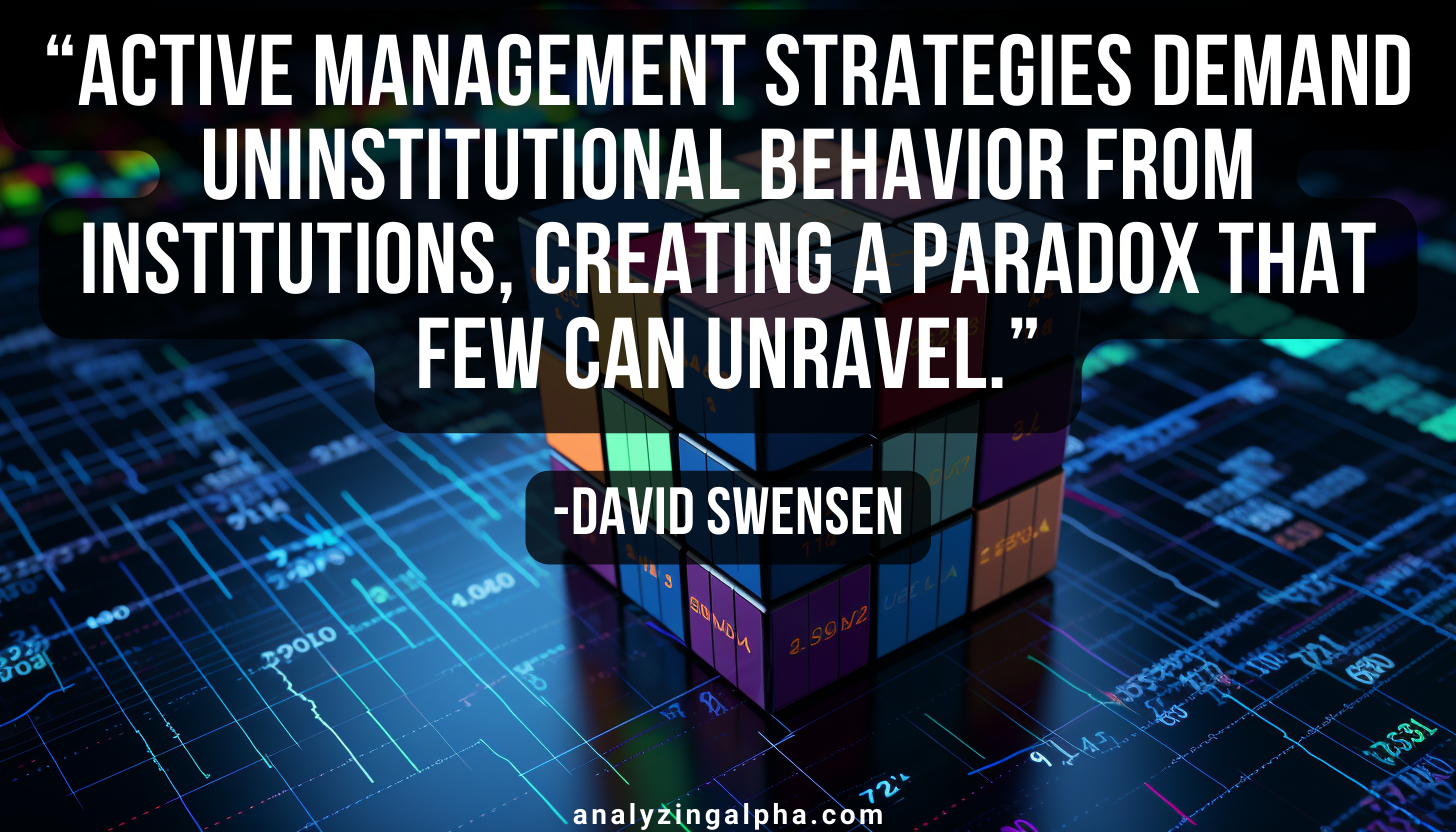
David Swensen presents an inherent flaw with institutions like hedge funds. He explains that their active management strategies demand them to behave in a way that goes against their very nature, causing problems for investors entrusting them with their hard-earned cash.
How so? Hedge fund managers following an active investment strategy are always on the move. They’re continually tweaking their portfolios, and while this might sound like a diligent approach, it comes with its own set of pitfalls. For starters, this hyperactivity ramps up the fees and costs for their clients. But that’s not all- it also opens a Pandora’s box of potential human errors.
That’s why Swensen advocates for passive management instead- think long-term investments with minimal trading. Investing in diversified assets that are poised to outperform the S&P 500 means you don’t need to micromanage your investments. Instead, sit back, relax, and watch as the value of your assets steadily climbs over time.
So, become a passive investor like Swensen. Steer clear of investment firms that make grand promises, yet are ensnared in the web of active management. Blaze your own trail like a true maverick, and watch your profits skyrocket.
2. “Establishing and maintaining an unconventional investment profile requires acceptance of uncomfortably idiosyncratic portfolios, which frequently appear downright imprudent in the eyes of conventional wisdom.”
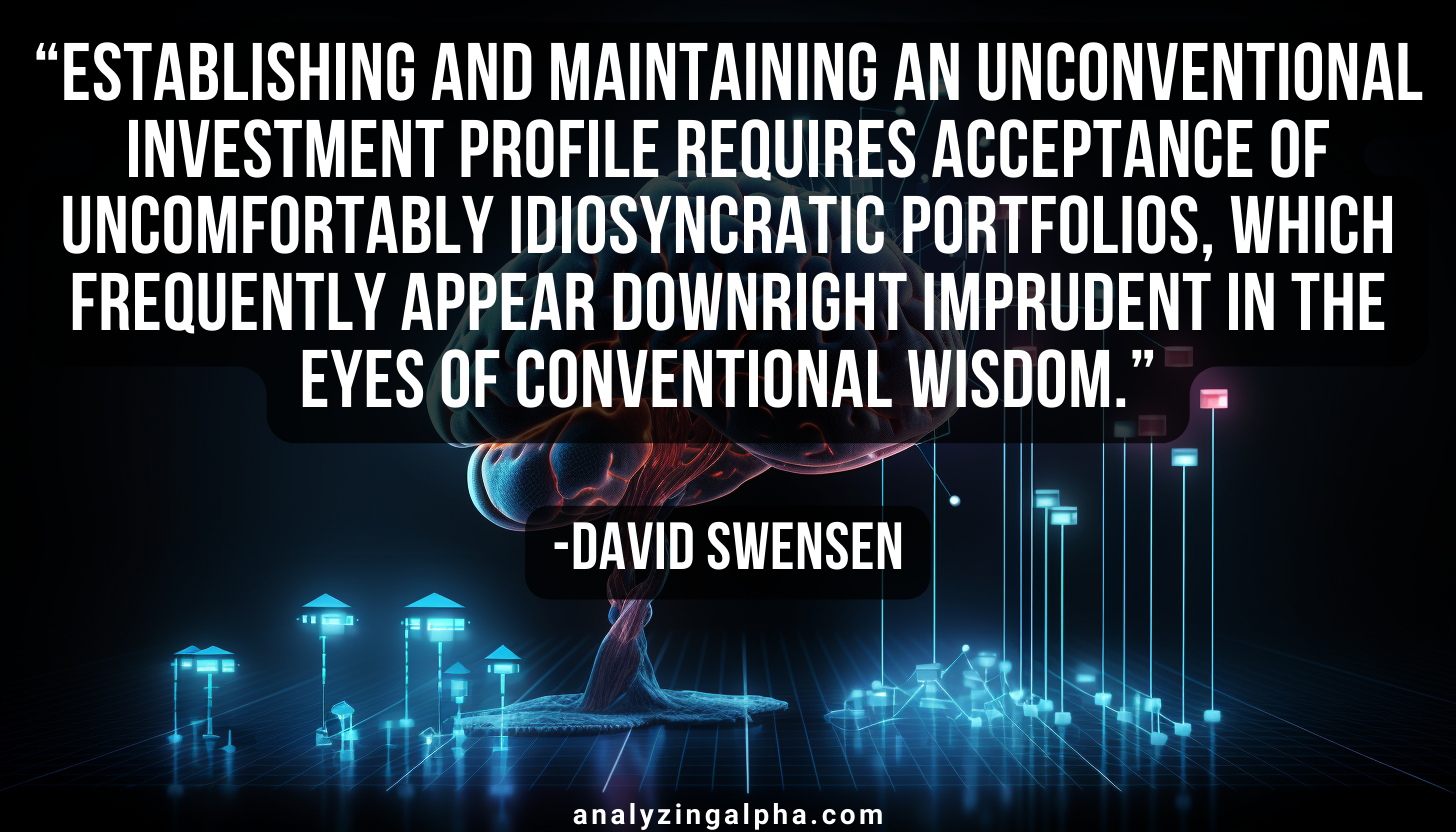
David Swensen might seem like a maverick, a daredevil even, in the investment world. As he explains in his book, “Pioneering Portfolio Management” he’s not afraid to go against the grain, buck the trend, and take risks that would make traditional investors break into a cold sweat. He’s a firm believer that to stand out in the crowded investment landscape, you’ve got to be willing to step off the beaten track.
Swensen doesn’t just invest; he dives headfirst into a vast range of asset classes, six to be exact. From high-octane tech start-ups to the more obscure corners of the market like Asian shampoo and soap companies, he shows us that the unconventional can be unexpectedly rewarding.
So, if you’re ready to shake up your investment strategy, embrace the risk, and reap the rewards, take a leaf out of Swensen’s book. Dare to be different. Explore the unconventional. And who knows? You might just strike gold like Swensen did for Yale.
3. “The mutual fund industry is not an investment management industry. It’s a marketing industry.”
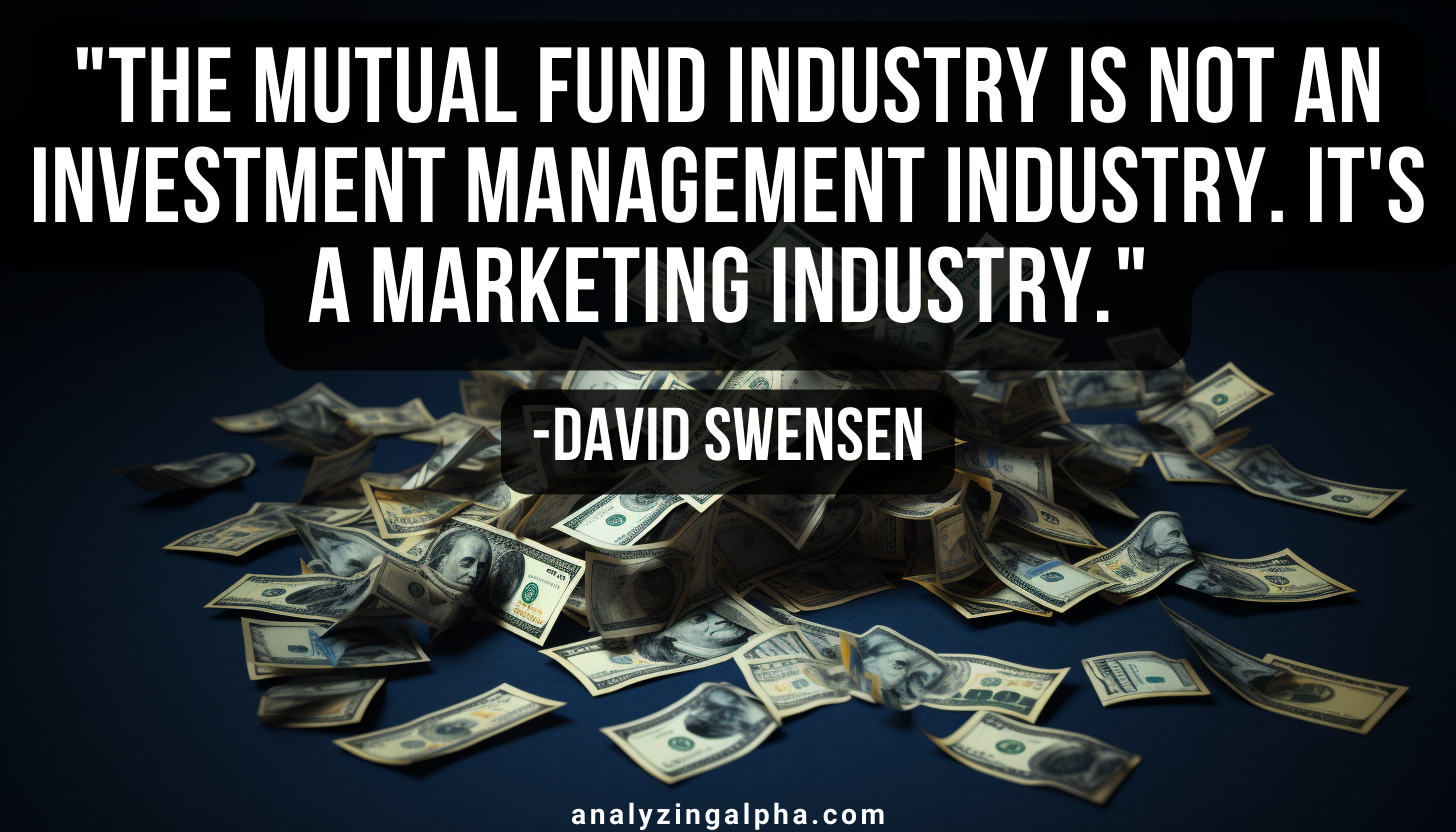
David Swensen suggests that the mutual fund industry is more interested in peddling products than in managing investments effectively. It seems these companies are often more focused on snazzy marketing tactics to reel in investors, rather than ensuring top-notch investment management. This approach could spell less-than-stellar investment results for you, the investor.
So, what should you do? Don’t take these companies at their word. Be a contrarian. Challenge the status quo. Do your own research before you plunk down your hard-earned money. This approach could lead to more informed decisions and potentially, a more robust return on your investment.
4. “If you talk to a businessman, a businessman is going to feed the winners and kill the losers. But in the investment world, when you’ve got a winner you should be suspicious about what’s next. And if you’ve got a loser, you should be hopeful — although not naively hopeful.”
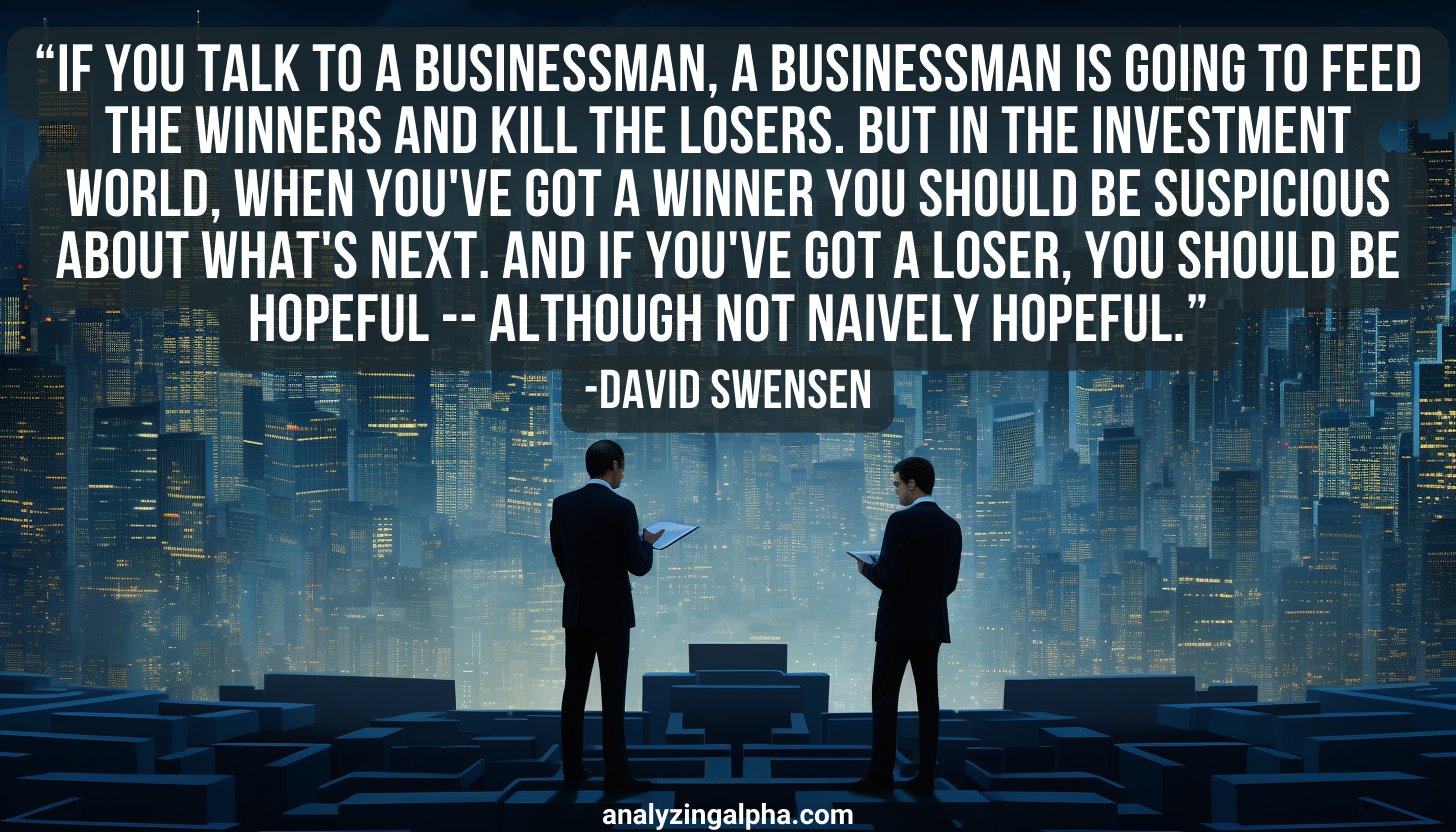
David Swensen draws a clear line between the mindset of a businessman and an investor. He suggests that businessmen are quick to back winners and ditch losers. But as an investor, you need to be more thoughtful.
When an investment is flying high, it’s crucial to scrutinize its future viability. On the flip side, don’t be too quick to write off a losing investment. Instead, dig deeper for signs of potential resurgence or growth.
But don’t be a Pollyanna about this. Swensen warns investors to be wary of hedge funds, notorious for their ‘businessman’ approach. He champions a contrarian approach to investing. This means doing your own research, making independent decisions, and not just following the herd.
5. “Supremely rational investors take the further step of acting against consensus, rebalancing to long-term portfolio targets by buying the out-of-favor and selling the in-vogue.”
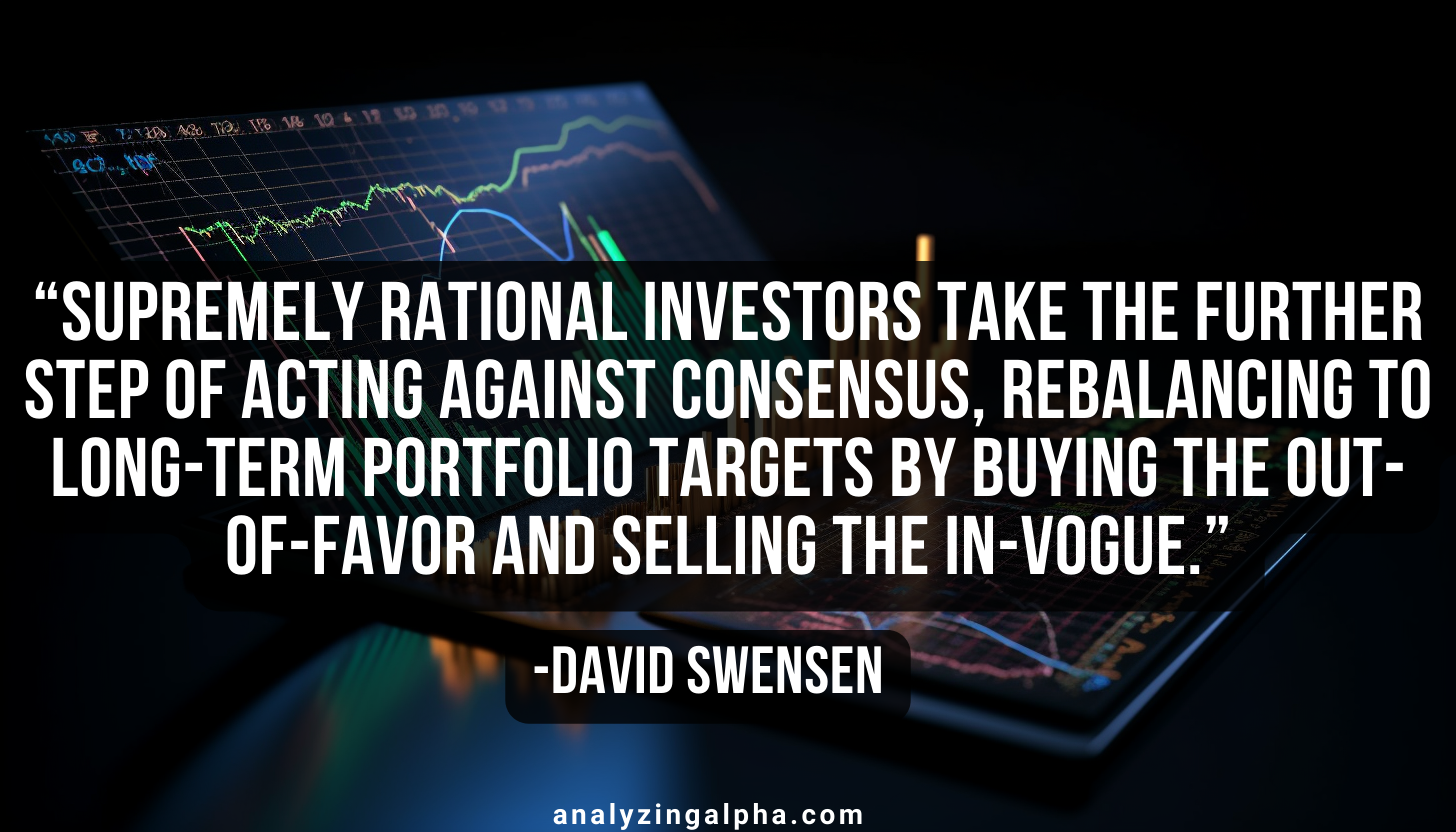
David Swensen suggests that the sharpest investors often buck the trend. They stick to a long-haul investment game plan, never swayed by the fickle winds of short-term market trends. Instead of snapping up the latest, trendy stocks, they hunt for undervalued or overlooked gems (think Warren-Buffett-style).
And when a stock becomes the latest fad and its price skyrockets? They sell. This wisdom underlines the importance of adjusting your portfolio based on your long-term goals, not the market’s latest whim. It nudges investors to blaze their own trail, keeping an eye on value and long-term growth potential. This strategy demands discipline, patience, and a solid grasp of market basics.
6. “Most active mutual funds are more interested in collecting fees than in boosting returns for investors.”

David Swensen warns that some active mutual funds are more invested in fattening their own pockets through management fees than in boosting your returns. It’s a disturbing revelation that suggests these funds may not always have your best interests at heart. With fees raking in a tidy sum, regardless of how the fund performs, a potential conflict of interest rears its ugly head.
So, what’s an investor to do? Be discerning. When choosing a mutual fund, don’t be dazzled by potential returns alone. Take a hard look at the fund’s fee structure. Ask yourself, “Is this fund really on my side?” Make sure your investments are being managed with your financial dreams front and center.
Or, why not break free from the pack? Be your own investment hero. Go independent and steer your own financial ship, unshackled from any hedge fund.
7. “Unless an investor has access to ‘incredibly high-qualified professionals,’ they “should be 100 percent passive – that includes almost all individual investors and most institutional investors.”
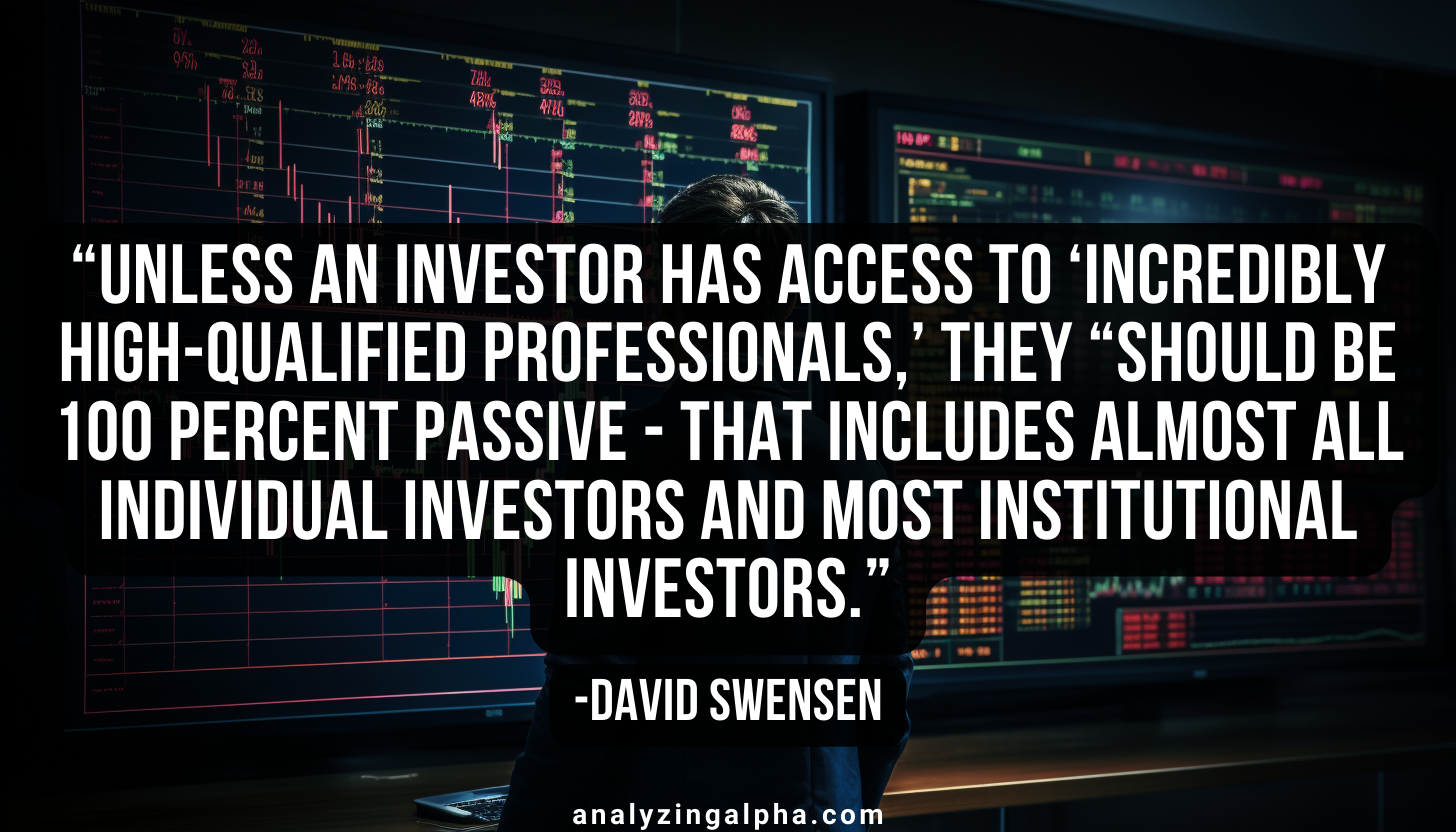
David Swensen has a powerful point: active investing isn’t for everyone. It’s a game best played by those with an arsenal of skilled professionals at their disposal. The takeaway? If you’re an independent investor, eager to control your own portfolio, it’s time to seize the power of passive investing, leaving the active approach in the dust.
You see, passive investing is like a steady, reliable friend. It’s all about crafting a diversified portfolio that mirrors a market index. No need for constant vigilance or decision-making whirlwinds. It’s a safer ride and kinder on your wallet.
So, if you’re not hobnobbing with the investment elite or have an undying desire to be an active trader, take a step back. Choose passive investment strategies. It’s a more secure, economical way to give your wealth a growth spurt.
8. “Never underestimate the gullibility of large pools of money.”
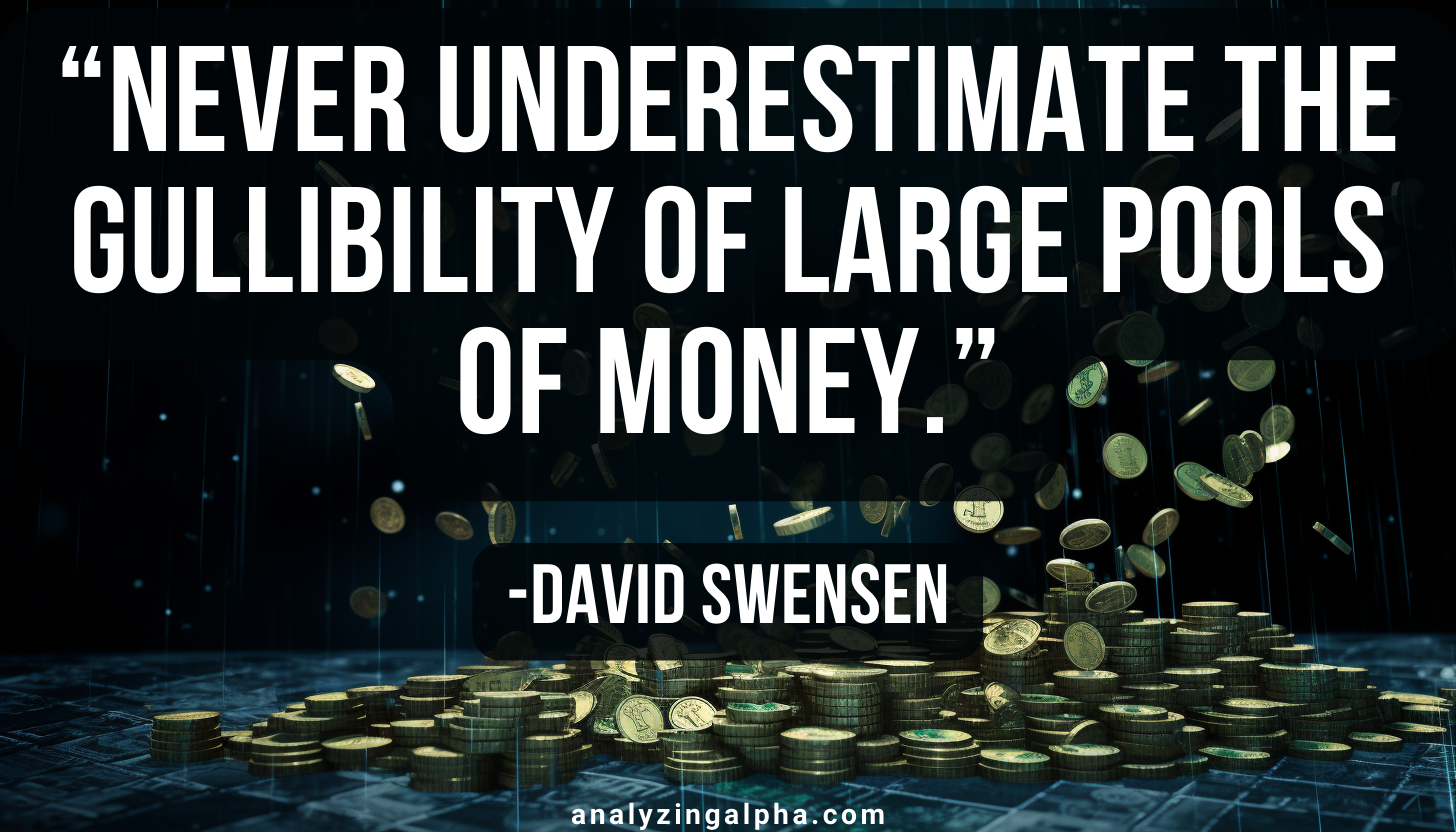
David Swensen warns us: large piles of money can often become playthings for the naive or unscrupulous. He paints a picture of big investors, bewitched by the allure of risky ventures, their eyes glazed over by greed or ignorance. Swensen’s words are a wake-up call, a shout from the rooftops: “Stay sharp! Be informed! Question everything!”
This isn’t just about protecting your investments from the siren call of unprofitable ventures. It’s about arming yourself with knowledge, with the kind of deep-dive understanding that transforms you from prey to predator in the investment jungle.
So how does Swensen do it? This investing guru performs careful in-depth analysis, looking at a company’s ROIs, Sharpe ratio, and historical performance.
9. “I think nobody is in a position to react to these big macro-issues. Where is the dollar going to be or what is GDP growth going to be in China? For every smart person on one side of the question, there is another smart person on the other side.”

David Swensen challenges the notion that predicting grand economic trends, like the dollar’s value or China’s GDP growth, is a walk in the park. He hints that for every pundit confidently predicting one outcome, there’s another equally confident pundit predicting the polar opposite. This underscores the wild unpredictability and mind-boggling complexity of global economic forecasting.
For investors, this is a wake-up call. Betting your investments solely on these macroeconomic prophecies is like walking a tightrope – it’s fraught with risk, especially when even the experts can’t agree. So, what’s the smarter move?
Consider casting a wider net. Diversify your strategy to include factors like individual company performance and market fundamentals. By doing so, you’re not just relying on one prediction, but a multitude of data points. It’s a more balanced, calculated approach to investing.
10. “Invest in low-turnover, passively managed index funds… and stay away from profit-driven investment management organizations.”
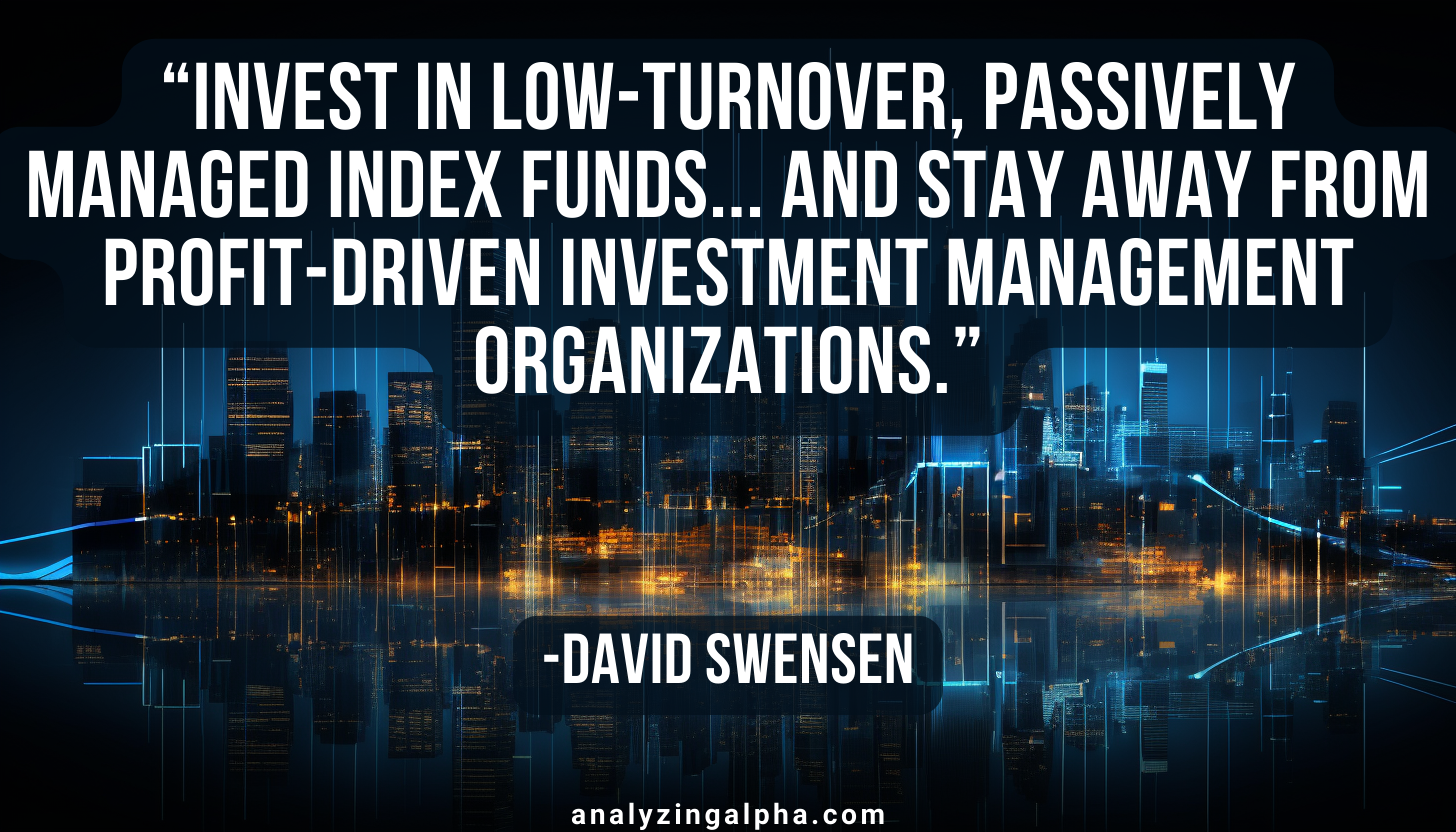
David Swensen has a golden nugget of advice for you: put your cash into low-turnover, passively managed index funds. Why? They follow a specific market index, need little trading or active management, and keep your costs low. It’s a smart, simple, and cost-effective strategy.
But that’s not all- Swensen also throws a red flag on profit-hungry investment management organizations. They often come with hefty fees and put their own profits before your returns. It’s like they’re eating your lunch! So, steer clear of these potential conflicts of interest.
Swensen’s advice boils down to this: choose investment strategies that keep costs low and dodge those with hidden agendas. This isn’t just a lesson in cost-effectiveness and transparency; it’s a roadmap to better long-term returns.
11. “That which works is authentic. It’s a practical truth. What really matters is that we find benefit, regardless of whether it’s an ancient traditional approach or some new version, popular or obscure.”

David Swensen urges us to embrace practicality and efficiency, casting aside the shackles of tradition or popularity. He insists that the real power of a strategy lies in its effectiveness, not its age or fame.
Swensen himself is a contrarian in the world of investing, fearlessly taking calculated risks. He doesn’t give a hoot about the popularity of an investment approach. Instead, he digs deep, does his own analysis, and makes savvy choices.
So, toss aside the popularity contest. Dig deep into a company’s numbers and seek out great managers with a competitive niche. This strategy is the secret to investing the David Swensen way and earning $31 billion in just over three decades.
12. “When you look at the results on an after-fee, after-tax basis over reasonably long periods of time, there’s almost no chance that you end up beating the index fund.”
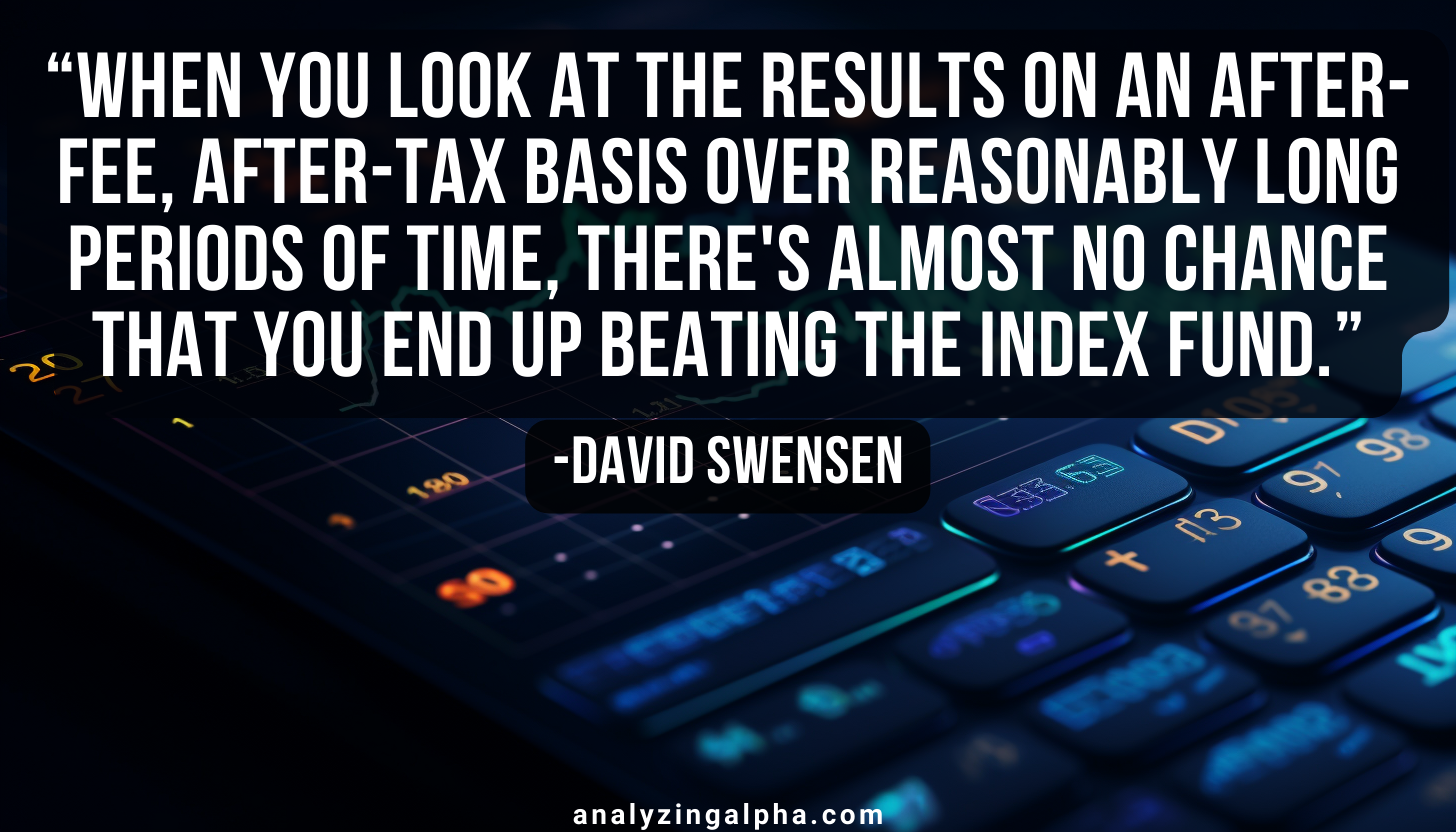
Straight from his book “Unconventional Success: A Fundamental Approach to Personal Investment,” David Swensen urges us to take a good, hard look at the power of index funds. He contends that when you factor in fees and taxes, it’s a tall order to beat the long-term returns of an index fund.
What’s an index fund, you ask? It’s a type of mutual fund or exchange-traded fund (ETF) that plays by preset rules. Its aim? To track a specific basket of underlying investments. The takeaway? Instead of trying to outsmart the market by picking individual stocks, it might be smarter to ride the wave of low-cost, tax-efficient index funds for the long haul.
13. “Millions of mutual-fund investors sleep well at night, serene in the belief that superior outcomes result from pooling funds with like-minded investors and engaging high-quality investment managers to provide professional insight. The conventional wisdom ends up hopelessly unwise, as evidence shows an overwhelming rate of failure by mutual funds to deliver on promises.”
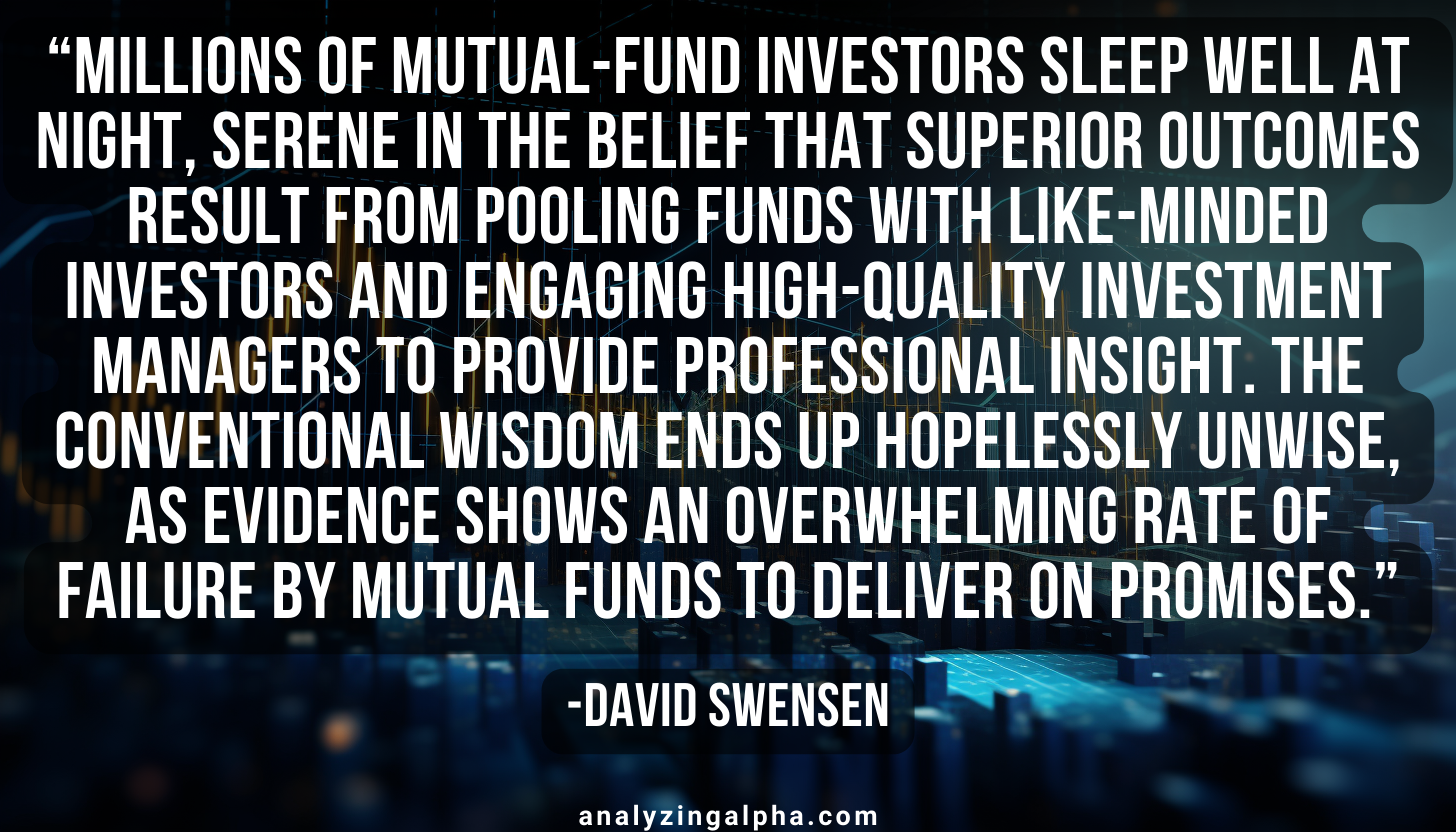
David Swensen throws a curveball to mutual fund believers. He challenges the common notion that bundling funds and hiring expert managers equates to bigger returns. The reality? It’s a myth. Evidence shows a staggering number of mutual funds failing to deliver on their promises.
So, what’s the takeaway for investors? Don’t be fooled by the glossy appeal of mutual funds. Don’t just follow the herd. Instead, take a sharp look at the performance and credibility of these funds before diving in. Or, better yet, blaze your own trail and skip mutual funds altogether.
The choice is yours. Be bold, be smart, and make your money work for you.
14. “Thoughtful investors build investment programs on a fundamental understanding of the reasons for pursuing a nonconventional approach.”

David Swensen urges you to dive deep and truly understand your investment strategies, especially when you’re taking the road less traveled. Forget about blindly following the crowd or jumping on the latest trend. Instead, make decisions steeped in knowledge and careful thought.
This syncs perfectly with Swensen’s contrarian style – a bold approach that dares to defy the norm. It’s about making investment choices that might raise a few eyebrows because they go against popular wisdom.
15. “I’ve always viewed high-frequency trading as a tax on the rest of us.”

David Swensen equates high-frequency trading (HFT) to a sneaky tax on everyday investors. Picture this: big financial firms unleash sophisticated algorithms to trade stocks at lightning-fast speeds, often within milliseconds. It’s a high-stakes game where they snatch up tiny price differences before anyone else gets a look in.
Swensen suggests these firms are effectively ‘picking the pockets’ of regular investors. They’re exploiting the market’s minuscule inefficiencies and bagging profits that could have been scooped up by slower, more traditional investors.
So, what’s the solution? Investors, it’s time to adapt and evolve. Get smart about the impact of HFT on your investments and consider tweaking your strategies. Think about focusing on long-term investing where HFT has less impact. It’s time to step up, take control, and outsmart the system. Let’s turn the tables on HFT and make your investments work harder for you.
Conclusion: Why Read David Swensen’s Quotes?
These quotes from David Swensen perfectly embody his investment strategy, which focuses on asset allocation, thorough research, and contrarian investing. His approach, though daring, offers valuable lessons to current investors about the significance of independence as opposed to participating in a hedge fund.
Let Swensen’s nuggets of wisdom be your compass on this thrilling investment voyage. The next step? Dive into the depths of Swensen’s investment philosophy with our comprehensive biography. Here, you’ll discover how to infuse his strategy into your own portfolio to earn millions and retire early.